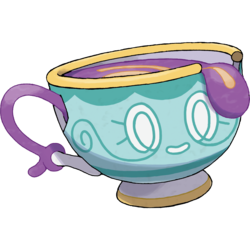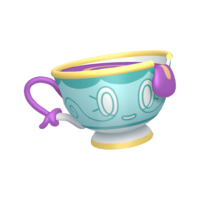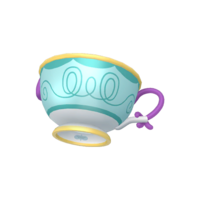From Bulbapedia, the community-driven Pokémon encyclopedia.
Sinistea (Japanese: ヤバチャ Yabacha) is a Ghost-type Pokémon introduced in Generation VIII.
It evolves into Polteageist when exposed to a Cracked Pot or a Chipped Pot. The item required depends on its form.
- The Phony Form[1][2] (if it lacks a stamp of authenticity) requires a Cracked Pot to evolve.
- The Antique Form[1][3] (if it has a stamp of authenticity) requires a Chipped Pot to evolve.
Biology
Sinistea is a Pokémon said to be created when a lonely spirit possesses a cold, leftover cup of tea. It is one of the shortest Pokémon in existence. The teacup that Sinistea lives in is a famous piece of antique tableware; seafoam green in color with gold rims and a lacy pattern that resembles a face. However, there are many forgeries in circulation. Antique Form Sinistea has a stamp of authenticity on the bottom of the cup, whereas Phony Form Sinistea lacks it. This stamp appears as a teal colored emblem on the bottom inside rim of the cup.
The swirl pattern on Sinistea's purple body serves as a weakness. Should a Sinistea get stirred, the swirl will disappear and cause it to get dizzy. Sinistea can absorb the life-force of anyone who drinks it. While it can wait patiently, most of Sinistea's opportunities end up being short, as it tastes so bad that it is spat out immediately. Sinistea inhabits hotels and homes.
In the anime
Main series
Major appearances
A Sinistea debuted in The Spectral Express!.
Minor appearances
A Trainer's Sinistea appeared in The Winding Path to Greatness!.
Pokémon: Twilight Wings
A Trainer's Sinistea appeared in The Gathering of Stars.
In the manga
Pokémon Adventures
Professor Magnolia owns a Sinistea and Polteageist, both in their Antique Form, as shown in Teary!! The Voice of the Master.
In the TCG
- Main article: Sinistea (TCG)
Game data
Pokédex entries
| This Pokémon was unavailable prior to Generation VIII.
|
| Generation VIII
|
|
Galar
#335
|
|
Galar
Crown Tundra #132
|
|
Sinnoh
#—
|
|
Hisui
#—
|
| This Pokémon has no Pokédex entries in Brilliant Diamond, Shining Pearl, and Legends: Arceus.
|
| Phony Form
|
| Sword
|
This Pokémon is said to have been born when a lonely spirit possessed a cold, leftover cup of tea.
|
| Shield
|
The teacup in which this Pokémon makes its home is a famous piece of antique tableware. Many forgeries are in circulation.
|
| Antique Form
|
| Sword
|
The swirl pattern in this Pokémon's body is its weakness. If it gets stirred, the swirl loses its shape, and Sinistea gets dizzy.
|
| Shield
|
It absorbs the life-force of those who drink it. It waits patiently, but opportunities are fleeting—it tastes so bad that it gets spat out immediately.
|
|
|
| Generation IX
|
|
|
Paldea
#237
|
| Phony Form
|
| Scarlet
|
The soul of someone who died alone possessed some leftover tea. This Pokémon appears in hotels and houses.
|
| Violet
|
Sinistea gets into your body when you drink it, and then it steals your vitality from within. It also tastes awful.
|
| Antique Form
|
| Scarlet
|
Some fanatics will go to great pains to prepare the perfect tea and teacup, eagerly waiting for a Sinistea to come and possess their selections.
|
| Violet
|
This Sinistea lives in an antique teacup. As valuable as this Pokémon is, its awful taste remains unchanged.
|
|
|
Game locations
| This Pokémon was unavailable prior to Generation VIII.
|
|
|
|
|
In events
Stats
Base stats
| Stat
|
Range
|
| At Lv. 50
|
At Lv. 100
|
40
|
|
100 - 147
|
190 - 284
|
45
|
|
45 - 106
|
85 - 207
|
45
|
|
45 - 106
|
85 - 207
|
74
|
|
71 - 138
|
137 - 271
|
54
|
|
53 - 116
|
101 - 227
|
50
|
|
49 - 112
|
94 - 218
|
Total: 308
|
Other Pokémon with this total
|
- Minimum stats are calculated with 0 EVs, IVs of 0, and (if applicable) a hindering nature.
- Maximum stats are calculated with 252 EVs, IVs of 31, and (if applicable) a helpful nature.
|
Type effectiveness
| Under normal battle conditions in Generation IX, this Pokémon is:
|
|
|
|
|
|
|
|
|
|
|
|
|
Learnset
|
|
|
|
- Bold indicates a move that gets STAB when used by Sinistea
- Italic indicates a move that gets STAB only when used by an Evolution of Sinistea
|
|
|
|
|
- Bold indicates a move that gets STAB when used by Sinistea
- Italic indicates a move that gets STAB only when used by an Evolution or an alternate form of Sinistea
|
|
|
|
|
- Moves marked with an asterisk (*) must be chain bred onto Sinistea
- Bold indicates a move that gets STAB when used by Sinistea
- Italic indicates a move that gets STAB only when used by an Evolution of Sinistea
|
TCG-only moves
Side game data
Evolution
Phony Form
Antique Form
Sprites
| This Pokémon was unavailable prior to Generation VIII.
|
|
|
|
|
Trivia
- Antique Form Sinistea does not obey typical form inheritance rules when breeding, and therefore cannot produce Eggs that contain Antique Form Sinistea. All Sinistea that hatch from Eggs will always be Phony Form, regardless of the parent's form.
- Sinistea is tied with Roaming Form Gimmighoul as the shortest Ghost-type Pokémon.
- Sinistea was designed by James Turner.[4]
Origin
Sinistea is based on a ghost (possibly a poltergeist, a mischievous ghost that possesses objects) possessing a cup of tea,[4] which has historical and cultural significance in the United Kingdom, the country Galar is based on. The way Sinistea holds its own cup references a way of holding a teacup with one's pinky finger sticking out,[5] which is commonly and erroneously believed to be part of tea drinking etiquette. Additionally, the bit of tea hanging from Sinistea's rim resembles both a tongue and a tea bag tag.
Sinistea's forms may be based on porcelain forgeries. One way porcelain makers historically combatted forgeries was to create a stamp of authenticity on their products, hence the stamp under Antique Form Sinistea.
Name origin
Sinistea may be a combination of sinister and tea.
Yabacha may be a combination of やばい yabai (dangerous; terrible) and 茶 cha (tea).
In other languages
| Language
|
Title
|
Meaning
|
 Japanese Japanese
|
ヤバチャ Yabacha
|
From やばい yabai and 茶 cha
|
 French French
|
Théffroi
|
From thé, froid and effroi
|
 Spanish Spanish
|
Sinistea
|
Same as English name
|
 German German
|
Fatalitee
|
From fatal or fatalité and Tee
|
 Italian Italian
|
Sinistea
|
Same as English name
|
 Korean Korean
|
데인차 Dancha
|
From danger and 차 (茶) cha
|
 Mandarin Chinese Mandarin Chinese
|
來悲茶 / 来悲茶 Láibēichá
|
From 來 / 来 lái, 悲 bēi, 茶 chá, and a pun of 來杯茶 / 来杯茶 lái bēi chá
|
 Cantonese Chinese Cantonese Chinese
|
來悲茶 Lòihbēichàh
|
From 來 lòih, 悲 bēi, and 茶 chàh
|
|
|
|
| More languages
|
 Thai Thai
|
ยาบาฉะ Yabacha
|
Transcription of Japanese name
|
 Vietnamese Vietnamese
|
Yabacha
|
Transcription of Japanese name
|
|
|
|
Related articles
References
External links

|
This Pokémon article is part of Project Pokédex, a Bulbapedia project that aims to write comprehensive articles on each Pokémon species, as well as Pokémon groups and forms.
|


 For other sprites and images, please see Sinistea images on the Bulbagarden Archives.
For other sprites and images, please see Sinistea images on the Bulbagarden Archives.














